The ICT sector in Zambia continues to serve as a powerful catalyst for economic and social transformation. As highlighted in the 2024 Mid-Year Market Report, significant advancements in telecommunications have driven widespread digital access, with mobile network subscriptions reaching 21.9 million by mid-2024, reflecting a penetration rate of 109.2%. This surge underscores the critical role telecommunications play in fostering connectivity, innovation, and sustainable development across the country.
According to the United Nations Sustainable Development Group, "Zambia has embarked on a transformative journey towards a digital future, making significant strides in recent years. Internet access has been steadily increasing, with approximately 11.4 million active internet subscribers as of 2024, reflecting the country’s commitment to expanding digital connectivity and bridging the digital divide."
Investments in projects like the Universal Access and Service Fund (UASF), which saw the construction of 51 new telecommunication towers, are helping to bridge the digital divide and extend essential services to underserved communities.
The Government's forward-thinking policies are further encouraging growth. For instance, introducing a national Artificial Intelligence (AI) Strategy and the Start-Up Bill is poised to drive innovation and entrepreneurship in the ICT sector. As Zambia looks toward its digital future, telecommunications will be pivotal in supporting emerging technologies like AI, 5G, and the Internet of Things (IoT).
Read the full report here.
The mobile sector in Kenya has grown, with total mobile subscriptions reaching 68 million, representing a penetration rate of 132.1%. This growth has been driven by operator customer win-back campaigns. Additionally, Machine-to-Machine (M2M) subscriptions rose to 1.607 million.
The sector also experienced growth with mobile money subscriptions increasing to 38.7 million, a penetration rate of 75%. The growth was spurred by the removal of withdrawal codes for transactions conducted between M-Pesa and Airtel Money, allowing seamless fund transfers among the two mobile wallets. Read more
Hosted by the Communications Authority of Kenya (CA), the 29th Annual Assemblies & Extra-Ordinary Congress provided a unique platform for East Africa Communication Organizations (EACO) members and stakeholders to interact, network, exchange experiences, and share insights under the theme "Promoting Digital Transformation in the EAC Region." Delegates to the event included policymakers, legislators, regulators, ICT sector operators/service providers, academia, and ICT consumers from across the East African region.
Opening Session
In his keynote address, the Cabinet Secretary for Information, Communication & Digital Economy in the Cabinet of Kenya, Eliud Owalo, drew relevant case studies from Kenya's successes in advancing the ICT ecosystem. He cited the investments made in infrastructure development that have seen the setting up of over 2,000 public Wi-Fi hotspots, which have deepened affordable access to the mobile internet. He said these were geared towards creating digital marketplaces and boosting connectivity to traders and entrepreneurs, particularly the youth and women, to gain full employment within the digital ecosystem. He also highlighted the successful digitalization of at least 80 per cent (17,017) of public services.
Owalo lauded the East Africa Communications Organization (EACO) for its incredible efforts in advocating for the harmonization of legal and regulatory regimes in the region, saying they are instrumental in realizing digital transformation and providing a united approach to leveraging the full benefits of the region's digital economy.
He added that the success of the One Network area would facilitate increased interaction and e-commerce in the region. At the same time, he called for further collaboration in areas such as cyber security, SIM card registration, standardization of ICT equipment and services in the region, e-waste and green ICTs, which remain critical in catalyzing our attainment of digital transformation goals.
Addressing the session, the Director General of the Communications Authority of Kenya (CA), David Mugonyi, noted that by March 20024, the country had 132 per cent mobile penetration, 51.2 million Internet subscribers, and 38.6 million mobile money users. Smartphone penetration, he said, stood at 67 per cent even as the authority strives to keep average access charges for services such as mobile voice, data, and internet affordable for all.
He added that the regulator was committed to ensuring 100 per cent 3G and 4G population coverage in Kenya. The deployment of 5G technology will present new opportunities for all sectors of the economy. Mugonyi said the Communications Authority had implemented a regulatory sandbox to allow for the controlled use of emerging innovations and testing of new ideas before deployment to the market.
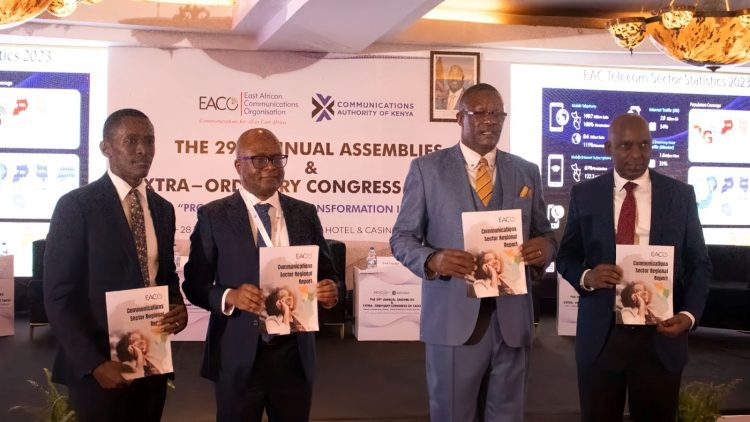
EACO utilized the opening session to unveil The 2023 EACO Communications Sector Regional Report. EACO Executive Secretary Dr. Ally Simba said the extent of coverage of basic mobile connectivity has been influenced by factors such as infrastructure, investment, and regulatory environments.
According to the report, the region has witnessed remarkable advancements in network coverage, a surge in mobile and internet subscriptions, and notable growth in mobile money services with Internet traffic at 54 per cent, with population penetration coverage of 2G averaging 92 per cent, 3G at 78 percent, and 4G averaging 62 per cent. Mobile internet subscriptions stand at 61 percent penetration with 122.3 million subscribers.
These advancements have been influenced by infrastructure, investment, and regulatory environments and have been pivotal in driving socio-economic growth, fostering digital inclusion, and enhancing connectivity across East Africa.
Session 1: High Level Roundtable Discussion on The Role of ICT in Promoting Digital Transformation in the East African Region
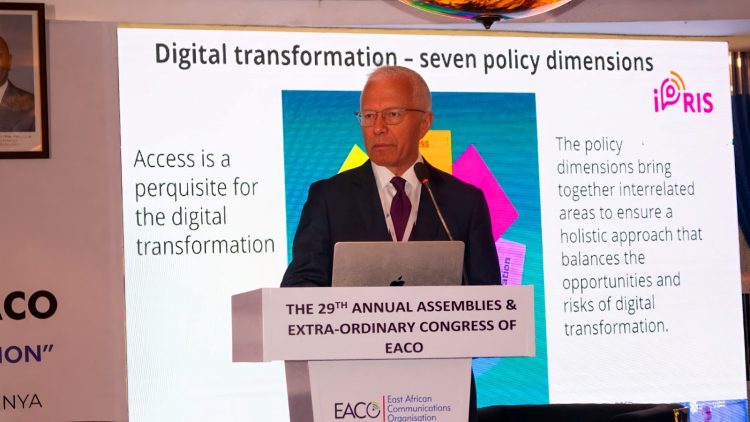 Bengt G Mölleryd- Senior analyst, Swedish Program for ICT in Developing Regions SPIDER
Bengt G Mölleryd- Senior analyst, Swedish Program for ICT in Developing Regions SPIDER
Bengt Molleryd from SPIDER (Swedish Program for ICT in Developing Regions) delivered a compelling opening presentation titled The Steps Towards Digital Transformation in the East African Region. He underscored the critical role of policy and regulatory frameworks in driving digital transformation and positioning the region to compete globally.
In his presentation, he shared some key insights that are critical to the region's attainment of global standards in regulation and technical capacity development. His submissions provided a roadmap for promoting digital transformation in East Africa through strategic policy and regulatory reforms. By addressing infrastructure, affordability, literacy, and regional cooperation, the region can unlock its digital potential and compete globally.
Here is a summary of Bengt's insights:
Other representatives from the region's telecommunications sector regulators engaged in an insightful panel discussion highlighting their respective countries' enormous gains in developing their ICT and telecommunications sectors. They also spotlighted the bottlenecks that continue to hinder the fuller development and exploitation of the sector to match those in more advanced economies.
Despite the challenges the regional ICT sector grapples with, the delegates were confident that the region is on the right track and riding on the support from other partners like SPIDER through its capacity-building program, iPRIS (ICT Policy & Regulation – Institutional Strengthening), East Africa is poised to rise to the global stage and compete effectively in providing the necessary technical and regulatory environment to bridge the digital divide and unlock the untapped potential for innovations and investments in the ICT sector.
Representatives of National Regulatory Authorities (NRAs) from the East Africa region engaged in in-depth subject matter conversation in a lengthy panel discussion dissecting the region's ICT landscape from both technical and regulatory viewpoints. The panelists were:
They were joined by William Baraza, the Director of the African Advanced Level Telecommunications Institute (AFRALTI), who moderated the session.
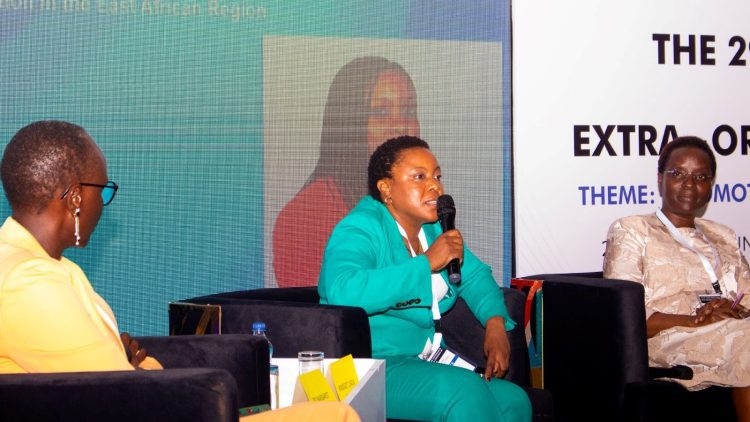 Bridget Linzie- The Executive Secretary at the Communications Regulators’ Association of Southern Africa (CRASA)
Bridget Linzie- The Executive Secretary at the Communications Regulators’ Association of Southern Africa (CRASA)
Commenting on the harmonization of regional digitalization instruments in the Southern Africa region, Bridget Linzie said: "CRASA's approach in regards to digital transformation is to ensure that we bring our people, our citizens the digital connectivity as well as services and applications that will move forward our various economic sectors to where our governments want it to be. This digital transformation strategy has already looked into the strategic goals of where we want to take SADC (Southern Africa Development Community) by 2030. And we also ensured that we look even after the continental strategy and African Union and incorporate the continental agenda into the digital transformation strategy for SADC and as regulators."
Regarding achieving universal access in the East Africa region, Ms Angela Wamola said: "To ensure that unserved and underserved populations are covered, regulators and operators must make deliberate initiatives to ensure that we achieve this total digital transformation. So, there is an opportunity to see ourselves as partners and work together to progress our digital transformation agenda."
Other salient areas the panelists pivoted on and that are core to the region's ICT sector included regional harmonization of policy and regulation, infrastructure development, affordability and accessibility of ICT services, the population's digital literacy, regional cooperation and global best practices.
Session 2: The Role of ICT in Promoting E-commerce in Postal and Courier Services
This session featured speakers such as Joan Toroitich, the General Manager of Payment Services at the Postal Corporation of Kenya, Molefe Mathibe, the CEO of JMAT Business Advisory Services, and Dr. Sifundo Chief Moyo, the Secretary General of the Pan African Postal Union (PAPU).
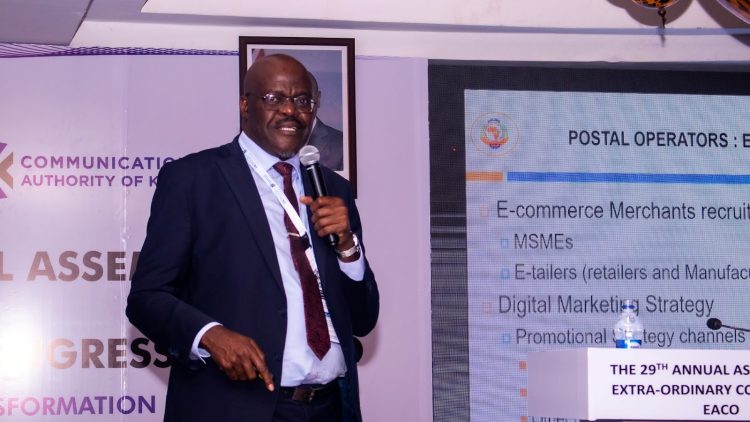 Dr. Sifundo Chief Moyo.- Secretary General Pan African Postal Union (PAPU)
Dr. Sifundo Chief Moyo.- Secretary General Pan African Postal Union (PAPU)
The region's sector representatives discussed the strides made and challenges encountered, particularly in the rapidly evolving technological landscape.
The discussions highlighted significant progress in revolutionizing postal services and the challenges encountered in a rapidly evolving technological landscape. They also highlighted existing policy and regulatory frameworks in leveraging digital technologies to enhance service delivery in the face of a rapidly evolving technological landscape.
Session key highlights
The workshop acknowledged the strides made in integrating ICT with postal and courier services, leading to improved efficiency and customer satisfaction. Digital platforms have streamlined operations, enabling faster and more reliable parcel tracking and delivery. Notable success stories included the adoption of mobile apps and online portals by several East African postal services, which have facilitated easier access to services for customers.
The workshop recognized the transformative impact of mobile payments on e-commerce in the region. Services such as M-Pesa in Kenya and MTN Mobile Money in Uganda have revolutionized payment systems, making transactions more accessible and secure for both consumers and businesses.
Despite these advancements and the fast-paced evolution of technology, the sector faces significant challenges, primarily due to infrastructure deficits, particularly in rural areas. The lack of reliable internet connectivity and poor road networks hamper efficient service delivery in remote regions. Keeping up with the latest digital innovations requires substantial investment in infrastructure and continuous workforce upskilling.
Existing policy and regulatory frameworks are another obstacle since they are often outdated and do not adequately address the needs of the modern digital economy. There is a pressing need for policymakers to develop and implement regulations that support technological innovation and ensure a level playing field for all market participants.
Regulatory challenges also include ensuring consumer protection in the digital space, combating cybercrime, and fostering a competitive market environment. Participants called for more dynamic and responsive regulatory approaches to keep pace with technological advancements.
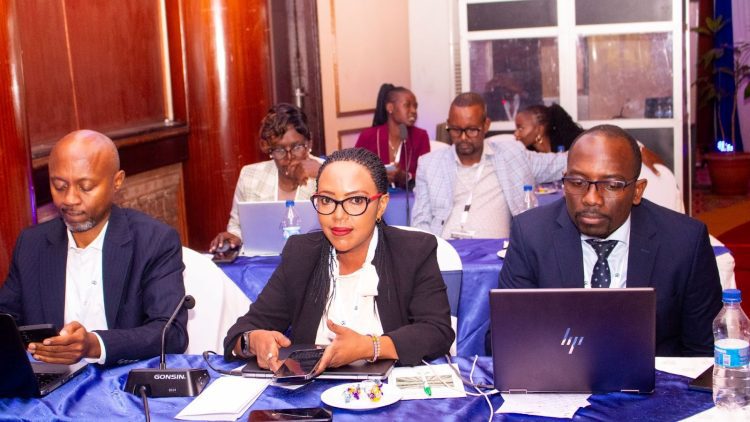 Delegates listening in during the EACO 29th Annual Assemblies & Extra-Ordinary Congress.
Delegates listening in during the EACO 29th Annual Assemblies & Extra-Ordinary Congress.
A recurring theme was the necessity for harmonized policies across East Africa to facilitate cross-border e-commerce. Unified regulations would streamline operations, reduce the complexity and costs associated with cross-border transactions, and enhance collaboration between countries, creating a more integrated and competitive regional market that can better compete on a global scale.
The digital divide between urban and rural areas continues to be a pain point. Rural regions often lack the necessary infrastructure to support advanced ICT solutions, which hampers the delivery of efficient postal and courier services in these areas.
The importance of capacity building was underscored, with discussions focusing on the need for continuous training programs for postal and courier service staff. Equipping personnel with digital skills is crucial for effectively managing ICT tools and platforms.
In conclusion, whereas the region has made significant strides in developing and deploying telecommunications technologies, there is still more ground to be covered in reforms in policy and regulation to facilitate harmonization and cooperation. The region stands at a pivotal moment in its journey towards deepening access and affordability to unlock its digital economy potential and participate more fully in the global arena.
In this context, iPRIS continues to empower telecom regulators in sub-Saharan Africa to boost their capacity to shape and implement regulatory frameworks in the telecommunications sector.
The week-long assembly also featured a packed schedule, including a full-day committees and working group meetings such as the Legal and Constitutional Affairs Committee (LCAC), Finance, Audit & Risk Management Committee (FARMC), EACO Communications Sector Indicators Harmonization and ICT Infrastructure Development, Connectivity, Sharing & Digital Inclusion, among others.
EACO has adopted a new Constitution to effectively deliver its mandate during the Extra-Ordinary in Nairobi. EACO has also admitted ARPTC of DRC and NCA Somalia as new Members and Observers, respectively.
[/et_pb_text][/et_pb_column][/et_pb_row][/et_pb_section]
In a landmark move driven by its active participation in the ICT Policy & Regulation – Institutional Strengthening (iPRIS) programme, the Information and Communication Technologies Authority of Mauritius (ICTA) has announced comprehensive cybersecurity guidelines for all licensed telecommunication operators. These guidelines are designed as robust self-assessment tools, enabling operators to critically evaluate and enhance their security preparedness. The guidelines are available here
ICTA delegates part of the second round of iPRIS
Three ICTA representatives, Mr. Trilok Dabeesing, Director of IT, Ms. Priya Chutoorgoon, Legal Officer, and Mr. Pralash Nahullah, Engineer, Licensing officer, are currently engaged in the 13-month-long iPRIS peer-to-peer learning programme as part of the second iPRIS Cohort (2024 A). iPRIS aims to bridge the digital divide by boosting the capacities of African telecommunications regulatory bodies through peer to peer learning.
In May 2024, they started the peer-to-peer learning programme by participating in an intensive three-week peer-to-peer learning session in Stockholm Sweden. The sharing of best practices among African and European peers during the iPRIS European Phase in May significantly inspired ICTA's efforts to strengthen cybersecurity measures within the telecom sector.
The intensive session for the 2024 A cohort included participation by European (PTS and ILR) and African NRAs from Gambia, Lesotho, Rwanda, Tanzania, Uganda, and South Africa and regional regulatory bodies from West, East, Southern, and Central Africa.
The NRAs represented in the 2024 A cohort include The Gambia’s Public Utilities Regulatory Authority (PURA), Lesotho Communications Authority (LCA), Rwanda Utilities Regulatory Authority (RURA), Independent Communications Authority of South Africa (ICASA), Tanzania Communications Regulatory Authority (TCRA), and Uganda Communications Commission (UCC).
Strengthening the ICT security framework of Mauritius
These newly issued guidelines represent a pivotal step towards strengthening the security framework of Mauritius' telecommunications infrastructure. They reflect the nation’s commitment to staying ahead of evolving cyber threats and ensuring resilient digital connectivity.
“In Mauritius, telecom companies have traditionally self-regulated their security standards. However, in response to the rapidly escalating cyber threat landscape inherent in IP networks, there is a need to mandate that telecom service providers better manage security risks. The guidelines will not only enhance the security and resilience of nationwide infrastructure but also improve the management of security risks within their supply chains, including third-party suppliers”, Mr. Trilok Dabeesing, Director of IT at ICTA.
The authority will use these guidelines as a benchmark to issue forthcoming regulations to all telecommunication operators. These regulations will be issued at least six months after the date of issuance of the present guidelines and will be grouped into the following categories:
“The current 5G rollout necessitates a robust security regulatory framework due to its software-driven and virtual nature. Initially, based on these guidelines and forthcoming regulations, the first Directive to be issued by the Authority will extend them to other licensees”, Mr. Trilok Dabeesing, Director of IT at ICTA.
The guidelines are based on 29 security objectives aligned with the work of the European Union Agency for Cybersecurity (ENISA). These objectives outline security measures and evidence for their implementation. By implementing these guidelines and forthcoming regulations, Mauritius aims to enhance the security and resilience of its telecommunication infrastructure in the 5G era.
-END-
About iPRIS
ICT Policy & Regulation – Institutional Strengthening (iPRIS) contributes to bridging the digital divide by boosting the capacities of African telecommunications regulatory bodies. Engaging 43 countries in Africa, iPRIS aims to enhance inclusive digital connectivity and drive social and economic prosperity using ICT.
iPRIS provides peer-to-peer capacity-building for African National Regulatory Authorities and Regional Regulatory Organisations. It stems from the recognition of the significance of ICT policies and regulation in promoting digital inclusion, equitable access to the Internet, consumer rights protection, and personal data safeguarding.
The iPRIS project is implemented by SPIDER (the Swedish Program for ICT in Developing Regions ), The Swedish Post and Telecom Authority (PTS), and the Luxembourg Regulatory Institute (ILR). SPIDER coordinates the project and offers its expertise in the digital international development sector and in Diversity, Equity, and Inclusion (DEI). PTS is regulation content and policy lead for the project. ILR brings its expertise in European regulation and policy for the French speaking countries.
iPRIS is funded by the European Union, Sweden, and Luxembourg as part of the Team Europe Initiative “D4D for Digital Economy and Society in Sub-Saharan Africa” (Code: 001).
For more information, please contact
Ms. Edna Soomre
Project Lead iPRIS
ipris@spidercenter.org
Sustainable Data Infrastructure Webinar Highlights
On 19 June 2024, the Data Governance in Africa Initiative organised an online capacity-building webinar on sustainable data infrastructures in collaboration with GIZ, EstDev, and Smart Africa. This webinar underscored the necessity of robust data governance frameworks, stakeholder engagement, and technical considerations such as data standards, interoperability, and scalable architectures that can adapt to evolving technologies. It also addressed the environmental impact of data infrastructures, promoting energy-efficient technologies and responsible data management practices.
Panelists:
Key Highlights from the Webinar:
Economic and social impact of data
Data is a vital asset with transformative potential across various sectors, contributing to economic growth and improved quality of life. It can promote inclusiveness and sustainability in industries. According to Dr. Ott Velsberg, "Data centers today on a global scale range from 5-9% of electricity consumption. In countries with large-scale operations, electricity consumption can be over 10% yearly." Effective data lifecycle management goes beyond just deleting old files. It involves implementing intelligent archiving processes with tiered storage technologies like tape libraries and object storage for ageing out cooler data. Automation ensures stale data gets permanently erased without tying up pricey disk storage.
Promoting green ICT
Data centers are major energy consumers, often overlooked as environmental polluters. Large data centers can use between 1-5 million gallons of water daily, comparable to the consumption of towns with 10,000-50,000 people. The tech industry needs to adopt "green ICT" practices, including energy-efficient hardware and renewable energy sources, to reduce the environmental footprint.
The webinar examined the rising demand for data storage and processing that is raising environmental concerns. Data centers consume significant amounts of electricity, with global consumption ranging from 5-9% and potentially exceeding 10% in some countries. This realization should prompt the tech industry to embrace "green ICT" practices and technologies designed to minimize the environmental footprint of our insatiable digital appetite. Osman Issah emphasized this as a key priority, stating, "We must incorporate green ICT practices, implementing energy efficiency technologies and practices for reducing the environmental impact of data centers."
The need for collaboration
The panelists emphasised the need for robust data governance frameworks, stakeholder engagement, and technical solutions like data standards, interoperability, and scalable architectures. Effective data management involves policies for archiving, deletion, and tiered storage to reduce energy consumption. Engaging all stakeholders, including marginalised communities, is key to building sustainable data infrastructures. According to Bitange Ndemo, "We must have Common Data Standards, Protocols and Interoperability Frameworks, especially in Africa, to enable data integration and harmonisation across different sources and domains."
The role of data in enhancing the quality of life
Government policies and incentives, academic analytical modeling, and community involvement are essential for true sustainability. In today's technologically driven world, data is establishing itself as a crucial asset with revolutionary power in many areas of the economy. Data enhances the quality of life by promoting economic growth and having a cross-sectoral influence. It has the potential to revolutionise industries in ways that promote inclusiveness and sustainability.
Multifaceted importance of sustainable data infrastructures
The sustainable data infrastructure webinar, underscored the multifaceted importance of sustainable data infrastructures. Robust data governance frameworks, stakeholder engagement, and advanced technical considerations are essential in the face of rapidly evolving technologies. The webinar highlighted the economic and social impact of data, emphasising its transformative potential across sectors and its role in promoting inclusiveness and sustainability.
Data is a revolutionary asset with the potential to significantly enhance quality of life. Through effective governance, innovative technical solutions, and concerted efforts towards sustainability, data can drive economic growth and contribute to a more inclusive and sustainable future.
The 2023 EACO Communications Sector Regional Report was launched on 24 June 2024 during the 29th Annual Assemblies and Extra Ordinary Congress of EACO in Nairobi, Kenya. This 17-page report consolidates data analysed by the East Africa Communications Organisation (EACO) secretariat using inputs from the EACO databank. The indicators align with those reported in the ITU, ensuring consistency and reliability.
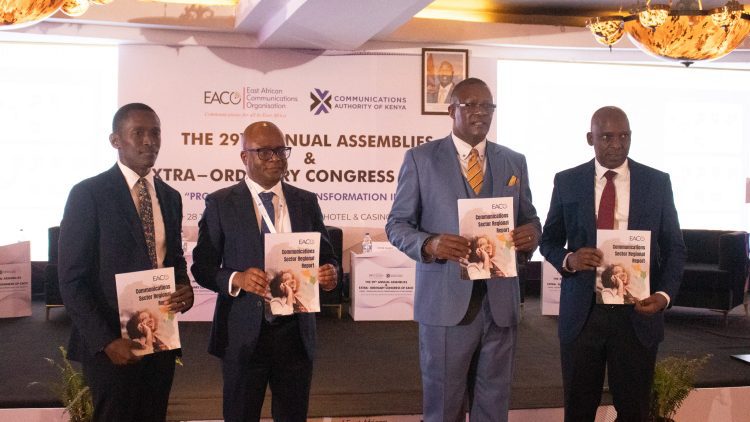
In the report foreword, Dr Ally Simba, Executive Secretary of EACO, explains, “Our region has witnessed remarkable advancements in network coverage, a surge in mobile and internet subscriptions, and notable growth in mobile money services. These developments have driven socio-economic growth, fostered digital inclusion, and enhanced connectivity across East Africa.”
Here are some highlights from the report:
EAC Telecom Statistics 2023
Network Coverage
Telephone Subscriptions and Mobile Data Tariffs
The mobile industry in East Africa is experiencing significant growth, with the average mobile penetration rate across the region reaching 100% in 2023. This growth outpaces both the average of the ITU Africa region (92% in 2023, up from 82% in 2021) and the global average (111% in 2023, up from 107% in 2021).
East Africa is one of the fastest-growing mobile markets in the world, and this growth is expected to continue in the coming years. This presents a significant opportunity for mobile operators, handset manufacturers, and other players in the mobile ecosystem.
The influx of low-cost smartphones from Chinese manufacturers has made mobile phones more accessible to a wider population. Increased competition among mobile network operators and government interventions have also driven down data costs, making internet access more affordable.
Services like M-PESA in Kenya have created a financial ecosystem reliant on mobile phones. The average mobile internet penetration in the East African Community region increased from 49% in 2022 to 51% in 2023.
Mobile data prices have fallen significantly across East Africa between 2020 and 2023. The falling price of mobile data, combined with the proliferation of smartphones and tablets, suggests that mobile data is becoming the primary way people access the internet in East Africa.
Domestic Voice Traffic
The domestic voice traffic segment in the ICT sector across the East African market has exhibited diverse performance trends from 2022 to 2023.
Key advancements in the EAC
The 2023 report highlights the significant progress in the telecommunications sector across the East African region. Key advancements in network coverage, mobile and internet subscriptions, and mobile money services have driven socio-economic growth, fostered digital inclusion, and enhanced connectivity. The East African mobile market continues to expand rapidly, presenting numerous opportunities for stakeholders. The falling data costs and increasing smartphone accessibility underscore the region's shift towards mobile data as the primary means of internet access. This growth trajectory is expected to persist, further solidifying East Africa's position as a dynamic and fast-growing telecommunications market.
The 29th Annual Assemblies and Extraordinary Congress of EACO will take place from 24-28 June 2024 at the Safari Park Hotel in Nairobi, Kenya. Hosted by the Communications Authority of Kenya (CA), this event will provide a unique platform for EACO members and stakeholders to interact, network, exchange experiences, and share insights under the theme "Promoting Digital Transformation in the EAC Region." Delegates to these Assemblies will include policymakers, legislators, regulators, ICT sector operators/service providers, academia, and ICT consumers from across the East African region.
We are pleased to announce that Dr. Bengt Mölleryd from SPIDER will deliver a keynote address during the high-level roundtable discussion on "Promoting Digital Transformation in the EAC Region" on the first day of the Assemblies. The roundtable will follow the official opening, presided over by Mr. Eliud Owalo, ICT Cabinet Secretary of Kenya, and the unveiling of EACO regional statistics. It will also feature prominent figures from Tanzania's Ministry of Information, Communications and Information Technology, Communications Regulators' Association of Southern Africa (CRASA), South Sudan's National Communications Authority (NCA), Uganda Communications Commission (UCC), Safaricom Kenya and the African Advanced Level Telecommunication Institute (AFRALTI).
The Assemblies will also feature workshops, committee and working group meetings, assemblies’ meetings, and an Extraordinary Congress over the course of the five days.
Download the programme here
The 2024 AI for Good Global Summit, held in Geneva from 30 to 31 May, emphasised AI's role in addressing global challenges and advancing sustainable development goals (SDGs).
The AI for Good Global Summit is the leading action-oriented United Nations platform promoting AI to advance health, climate, gender, inclusive prosperity, sustainable infrastructure, and other global development priorities. AI for Good is organised by the International Telecommunication Union (ITU) – the UN specialised agency for information and communication technology – in partnership with 40 UN sister agencies and co-convened with the government of Switzerland.
The summit emphasised the global community's concerns and hopes for AI by 2030, particularly regarding its focus on profit maximisation and social control. It aimed to harness AI's potential for positive change through collaborative efforts and stakeholder engagement.
Opening Remarks by Doreen Bogdan-Martin
Doreen Bogdan-Martin, Secretary-General of the ITU highlighted the digital divide and the potential of AI to drive safe, inclusive, and sustainable advancements. ITU Secretary-General Doreen Bogdan-Martin stressed the importance of inclusive and secure AI governance, highlighting the need to bridge the digital divide with 2.6 billion people still offline“The AI genie is out of the bottle. And there's no putting it back. But I think there is hope. You have sent a strong message to the world that the future of AI is not yet written. And as we look to 2030 and milestones, like the summit of the future in September, and next year's WSIS + 20 review, I think now is the time. Now is the time that we have to redouble our efforts. Let's redouble our efforts. Let's make AI innovation inclusive. Let's build safe, secure trustworthy AI systems. And let's scale AI solutions so that we can rescue the SDGs.”
Future of AI by Azeem Azhar
Azeem Azhar, Founder of Exponential View unpacked the dual nature of AI as a technological boon and societal challenge, with applications in education, geospatial data, and language processing. "In Tanzania, an energy company used data from Atlas AI to identify 75,000 households who could benefit from solar-powered electricity."
Tristan Harris, co-founder and executive director of the Center for Humane Technology highlighted the risks and governance gaps in AI development. "There's a thousand to one gap between the collective resources going into increasing AI capabilities versus those that are increasing safety."
Anna Koivuniemi, Head of Google DeepMind Impact Accelerator discussed AI's role in monitoring weather patterns, optimizing power grids, and developing biological systems to combat climate change. "There are much more important cases of extreme weather events like floods or forest fires that are today a reality; predicting them better may save lives."
Gita Gopinath, First Deputy Managing Director of the IMF discussed AI's potential risks in labor markets, financial markets, and supply chains, particularly during economic downturns. "Companies tend to replace humans with automation during downturns, leading to job losses. AI could accelerate this trend."
Hao Li, CEO and Co-Founder of Pinscreen discussed the transformative potential and ethical considerations of generative AI. "Together with the World Economic Forum, we've developed the first real-time deep fake technology to showcase that it is possible actually to have live conversations with a fake person."
Chieko Asakawa, IBM Fellow discussed how AI technology empowers people with disabilities, such as the AI Suitcase for the visually impaired.
Dr. Hakim Hacid, Acting Chief Researcher at the Technology Innovation Institute (TII) discussed the critical need to democratize AI and address the "AI divide" between nations and institutions. "These people who can access and use this AI are in a specific place of the globe, usually the northern hemisphere."
In conclusion, the 2024 AI for Good Global Summit underscored AI's immense potential to drive positive change across various sectors while highlighting the need for inclusive, ethical, and sustainable governance frameworks. The event fostered meaningful discussions and collaborative efforts to shape an AI-driven future that benefits all of humanity.
[et_pb_section fb_built="1" admin_label="section" _builder_version="4.16" global_colors_info="{}"][et_pb_row admin_label="row" _builder_version="4.16" background_size="initial" background_position="top_left" background_repeat="repeat" global_colors_info="{}"][et_pb_column type="4_4" _builder_version="4.16" custom_padding="|||" global_colors_info="{}" custom_padding__hover="|||"][et_pb_text admin_label="Text" _builder_version="4.16" background_size="initial" background_position="top_left" background_repeat="repeat" global_colors_info="{}"]
The ICT Policy & Regulation – Institutional Strengthening (iPRIS) project heralds a new era of Information and Communication Technology (ICT) advancement in Sub-Saharan Africa (SSA). From 2023 to 2028 and generously funded by the European Union (EU), Sweden, and Luxembourg, iPRIS is a transformative initiative building on the success of Sweden's preceding program from 2017 to 2022.
To participate in the iPRIS project, a National Regulatory Authority (NRA) needs to be a member of one of the following regional regulatory organisations: Assemblée des régulateurs télécoms de l’Afrique centrale (ARTAC), The Communication Regulators’ Association of Southern Africa (CRASA), The East African Communications Organisation (EACO), and The West African Telecommunication Regulators Assembly (WATRA). Additionally, the NRA must meet four essential criteria for consideration: commit to achieving gender balance among nominated staff for the change project, iPRIS will ensure representation from at least two African regions in each capacity-building round, be prepared for long-term engagement to achieve institutional capacity changes and have delegates with the professional mandate to lead institutional change. It is important also to consider that no more than seven countries can be included in each training round.
A Strategic Progression
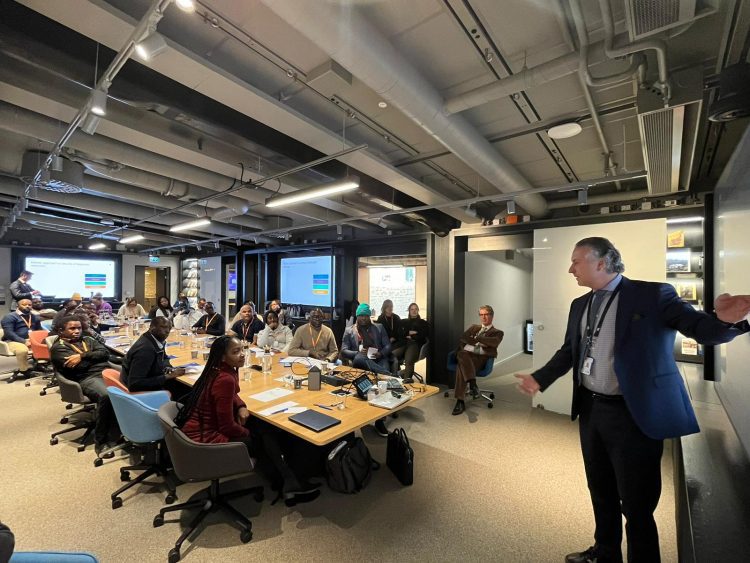
iPRIS represents a strategic progression to bolster the capacities of NRAs and regional regulatory organisations across Sub-Saharan Africa, primarily focusing on developing and implementing regulatory frameworks, especially in the telecommunications sector.
Core Objectives
The core objectives of iPRIS are ambitious and far-reaching:
Multi-Faceted Approach 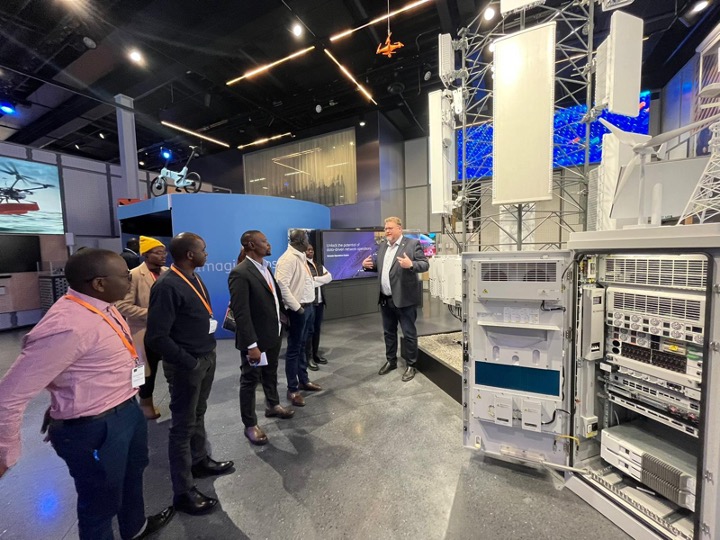
iPRIS adopts a comprehensive and multi-faceted approach to achieve its objectives:
Participating Countries
In the first round (2023A), iPRIS invites participation from countries associated with three regional regulatory organisations: WATRA, CRASA, and EACO. These countries collaborate to strengthen ICT policy and regulation in their respective regions.
NRAs at the Helm
At the heart of iPRIS are the NRAs from Kenya, Namibia, Eswatini, Sierra Leone, Nigeria, South Sudan, and Zambia. These visionary bodies are leading change initiatives that address crucial issues such as optic fibre infrastructure, rural ICT development, cybersecurity, spectrum management, and competition-related matters.
The following credentials, experience, or mandates are necessary for NRA workers to participate in the iPRIS project:
These qualifications and mandates are required for participation in the iPRIS project, guaranteeing that the selected personnel can effectively contribute to the project's aims and outcomes.
Collaborative Leadership
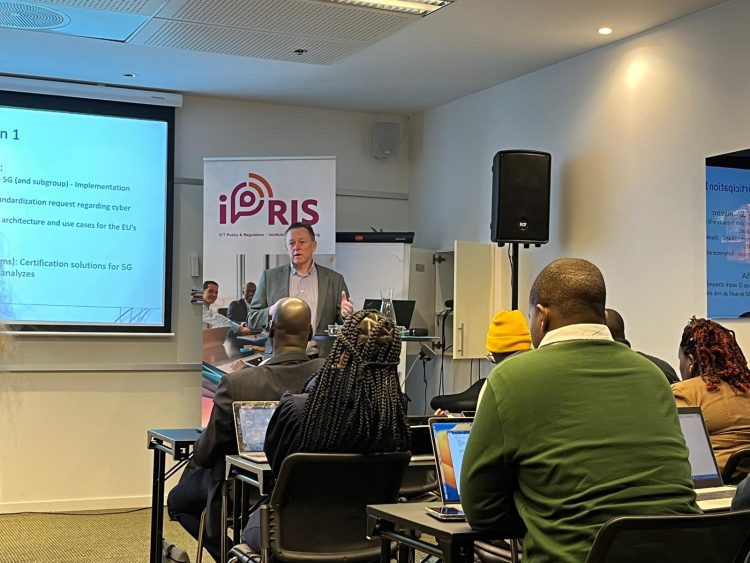
The iPRIS project is led by a dedicated team of experts from Sweden, including organisations such as SPIDER and PTS. The collaboration extends to the private sector with the involvement of companies such as Ericsson, Tele2, and STOKAB.
Shaping a Connected Future

Embarking on this transformative journey, the NRAs are at the forefront of shaping a connected, inclusive, and digitally empowered future for Sub-Saharan Africa. The iPRIS project aligns with global efforts to bridge the digital divide, emphasising robust regulatory frameworks' pivotal role in propelling the region into the digital age.
“Africa has the opportunity to learn from experts by jumping to advance level, without necessarily starting from scratch concerning policies, procedures and resources.”- David Deng, National Communication Authority of South Sudan (NCA)
About iPRIS
The ICT Policy & Regulation – Institutional Strengthening (iPRIS) project is a capacity-building initiative funded by the European Union, Sweden, and Luxembourg. It aims to enhance the capabilities of National Regulatory Authorities and regional regulatory organisations in Sub-Saharan Africa, focusing on developing and implementing regulatory frameworks in the telecommunications sector.
"iPRIS really provided us with an opportunity to meet fellow Africans, and this is something we will take with us." - Olivia Iyaloo M'kwaira, CRAN Namibia
[/et_pb_text][/et_pb_column][/et_pb_row][/et_pb_section]
Borgarfjordsgatan 12, Kista,SWEDEN
Postal Address: Stockholm University, Department of Computer and Systems Sciences/DSV, SPIDER, P.O Box 1073, SE-164 25 Kista, Sweden
Copyright © 2025 iPRIS. All rights reserved.